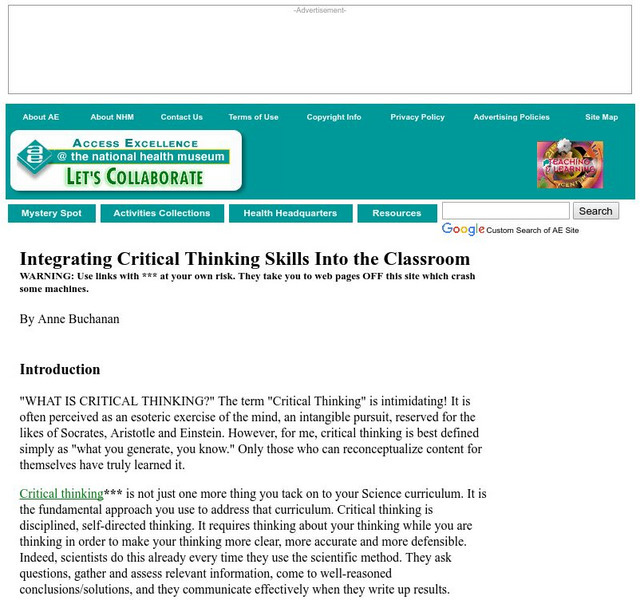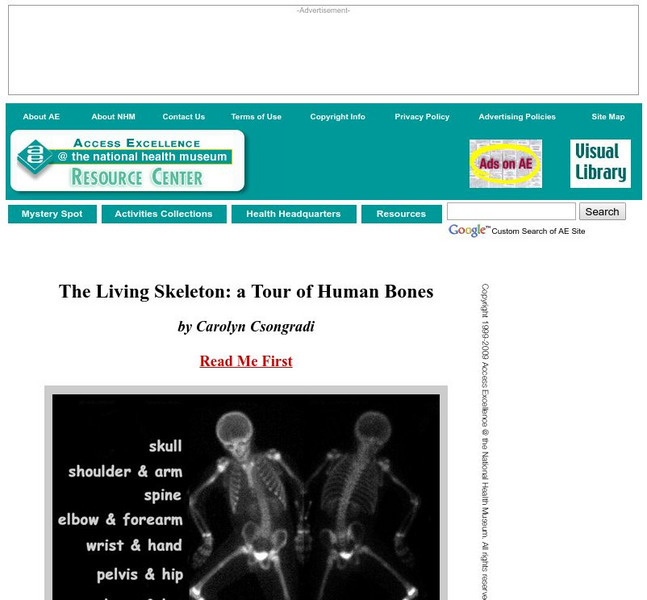National Health Museum
Access Excellence: Genetics the Easy Way
A great instructional activity that deals with genetic probability and recycling. Students will create a recycled "critter" based on genotype/phenotypes.
National Health Museum
Access Excellence: Transcription From Dna to M Rna
Access Excellence offers a graphical representation of the process of transcription from DNA to mRNA. A short explanation accompanies the diagram.
National Health Museum
Access Excellence: Step by Step Science Fair Success
This site from Access Excellence provides a wealth of information regarding how to run a science fair for middle school students. Content explores the planning process, guidelines, student tasks and paperwork, examples, assessment, and...
National Health Museum
Nhm: Amino Acid Sequences Show Evolution
This lesson plan focuses on differences in the amino acid sequence of hemoglobin and myoglobin proteins. They use the number of differences to create a phylogenetic tree.
National Health Museum
Access Excellence: Wolf Pack in a Bottle: Dna Simulation
This lesson plan can be used to illustrate the principle of electrophoresis without the equipment. Paper chromatography can be used to separate dye just like electrophoresis will separate DNA. The lab also covers DNA analysis for an...
National Health Museum
Access Excellence: Molecular Biology/primate Phylogeny
This lesson plan involves comparison of amino acids to create a phylogenetic tree of primates. Students will also use other species information to draw conclusions about evolutionary relationships.
National Health Museum
Access Excellence: Integrating Critical Thinking Skills
This site from Access Excellence explores how, as an educator, you can incorporate critical thinking skills into the classroom. Content focuses on how to cover content so that students can grasp information, engage with the teacher, read...
National Health Museum
Access Excellence: Hardy Weinberg Equilibrium
This site explores what Hardy-Weinberg Equilibrium is, and how teachers can explore this topic in their classrooms. Content includes background information on this topic, as well as numerous learning activities.
National Health Museum
Access Excellence: Dr. Frederick A. Murphy Talks About the Ebola Virus
"Dr. Murphy is considered one of the world authorities on viruses. He was the first one to look at the Ebola virus 'face-to-face' in the electron microscope." You will get his perspective on this terrible virus in a question and answer...
National Health Museum
Access Excellence: The Blackout Syndrome
Become a medical investigator trying to solve the cause of a mysterious disease. Through a four-part mystery series, students try to figure out the source of the disease and how to treat it. By reading clues students make predictions and...
National Health Museum
Access Excellence: The Living Skeleton: A Tour of Human Bones
Take a tour of the human skeleton and see computer images of various bones of the body, including the normal bone and bones that have anomalies.
National Health Museum
Access Excellence: Mitosis Diagram
An excellent Access Excellence color diagram showing the four principle phases of mitosis; includes a short description of each phase.
National Health Museum
Access Excellence: Dna Molecule Two Views
Access Excellence provides an excellent graphic showing the structure of the DNA molecule and its components.
National Health Museum
Access Excellence: Inheritance of Hemophilia
This site explains the X-linked inheritance of Hemophilia and includes a diagram.
National Health Museum
Access Excellence: Food Forensics
This site from Access Excellence provides a mini-unit on immunology for advanced students. Students discover antigen/antibody specificity using common foods. Students relate their findings to immunological responses such as allergies,...
National Health Museum
Access Excellence: Protein Synthesis
This Access Excellence diagram of protein synthesis shows both transcription and translation and includes a short description of each.
National Health Museum
Access Excellence: Genes
Access Excellence offers an explanation of genes is supplemented with an illustration of the placement of genes in a chromosome.
National Health Museum
Access Excellence: Dna Detectives
A hands-on activity from Access Excellence for advanced biology classes. Students are given a crime scenario and three suspects. Their mission is to determine 'Who Dunnit?' by obtaining and analyzing DNA samples. Requires extensive...
National Health Museum
Access Excellence: Human Chromosomes
This map from Access Excellence shows human chromosome pairs. The site includes a short description of chromosome structure, staining of chromosomes and karyotypes.
National Health Museum
Access Excellence: Sex Linked Inheritance: Drosophila
Here are graphics illustrating an experiment with drosophila fruitflies. Sex-linked inheritance is demonstrated here using eye color alleles on X chromosomes. Site by Access Excellence.
National Health Museum
Access Excellence: James Watson
Excellent overview of the scientific career of James Watson. Includes a black and white photo. This site also offers links to information on Rosalind Franklin, Linus Pauling, and the Human Genome Project.
National Health Museum
Access Excellence: Gregor Mendel
Basic information on the life and works of biologist Gregor Mendel.
National Health Museum
Assess Excellence: Barbara Mc Clintock
This Access Excellence site describes McClintock's work in genetics. Focuses on the idea of McClintock beinga pioneer as a woman working in scienceand the obstacles she had to overcome.
National Health Museum
Access Excellence: Linus Pauling (1901 1994)
This Access Excellence site provides a general biography of Linus Pauling, the two-time Nobel laureate who the elucidated chemical bonding, amino acid and protein structures, and the molecular basis of sickle-cell anemia.





